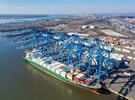Growth in all categories is what produce exporters and importers like to see. And that is the current state of the produce trade between Argentina and Philadelphia. “We are seeing good increases, especially for citrus products,” commented Marcelo Dagna of William H. Kopke, Jr., Inc., a leading US produce buyer.
Dagna was a panelist during a webinar hosted today by the Argentine Embassy in the USA and PhilaPort, the Pennsylvania agency managing Philadelphia’s port. The panel, “PhilaPort as a Produce Gateway: Customs, Trade and Commercial Logistics with the United States East Coast,” also included perishables logistics experts from Philadelphia. The webinar was designed to give advice to Argentine produce exporters who want to ship to one of their country’s largest trading partners.
 PhilaPort was the #1 port in the USA for Argentine produce last year. PhilaPort is also part of the largest produce port complex in the USA. In 2020, $3.8 billion in produce came up the Delaware River, and $5.2 billion arrived in the broader food products category.
PhilaPort was the #1 port in the USA for Argentine produce last year. PhilaPort is also part of the largest produce port complex in the USA. In 2020, $3.8 billion in produce came up the Delaware River, and $5.2 billion arrived in the broader food products category.
The value of Argentine citrus cargoes shipped to The Port of Philadelphia was $55 million in 2020. Apples and pears, long a mainstay of the Argentina – Philadelphia trade, also saw growth, and were valued at $39 million last year. The trade saw smaller increases in grapes, blueberries, mangos, dates, and other categories.
“Philadelphia has a real advantage for produce cargoes,” noted Chris Ryan of Americold Logistics, another panelist from today’s webinar. “The quality of the cold warehousing, the repacking operations, marine terminal velocity, fumigation – all of these are essential for fruits and vegetable imports into the USA, and Philadelphia is the leader in all of these areas.”
Argentine Ambassador to the United State Jorge Arguello welcomed the webinar panelists and attendees. Undersecretary Pablo Sivori of the Argentine Ministry of Foreign Affairs gave some opening remarks. The final speaker of the event, but the most interesting for many of the Philadelphia participants, was Federico Bayá, President of the Argentinean Blueberry Committee, who spoke on behalf of Fruits from Argentina. He gave a useful overview of the Argentine produce sector. More than 151 people registered for the webinar, including Argentine growers, US buyers, supply chain professionals in both countries, government officials and the media.
Ambassador Arguello commented, “For Argentina, the Port of Philadelphia is the main port of entry for the fruit and vegetable sector on the East Coast, having increased the cargo imported from our country in 2020 in all categories: citrus, pears and apples, among others. This joint seminar is the result of that relevance and of the partnership that has been growing between our country and the Port of Philadelphia.”
Another panelist well known to Argentine growers, Leo Holt, President of Holt Logistics, emphasized the effective communication and cooperation within the Port community as a reason for PhilaPort’s success, noting, “every link in the supply chain works effectively together in Philly. We know each other, and there is a high degree of trust. Those good working relationships are critical for a sensitive cargo like produce.”
Philadelphia has a long and friendly relationship with Argentina. In the early 1800’s, Philadelphia merchants supplied Argentine patriots with supplies for their struggle for independence. Argentine ships were repaired in Philadelphia. And Argentina’s leaders visited Philadelphia on their way to or from visits to US President James Madison and Secretary of State James Monroe in Washington.
Today, the bilateral relationship is strengthened by visits to Argentina by the Philadelphia port community, and through visits to the Port by Argentine public officials and exporters. Events such as the webinar also help to build bridges between the two natural trading partners.
“We are proud of our growing trade with Argentina,” said PhilaPort Director of Marketing, Sean Mahoney. Mahoney gave an overview of the Port during the webinar, and also served as the panel moderator.
Mahoney, who first visited Argentina in 1992, is focused on expanding Philadelphia’s lead as the premier gateway for Argentine produce: “We have the velocity to get produce to market quickly, proximity to 2/3rds of the US population, and the flexibility to give excellent service to high-quality Argentine produce.”
During his presentation, Mahoney discussed the Port’s fast rail service with Canada. CN Railway can bring produce from PhilaPort to Montreal and Toronto in under three days. Perishables industry leaders point out that, more than most ports, Philadelphia has well developed secondary and tertiary markets for produce, which is a good insurance policy for exporters.
Consumer data indicates that US shoppers have a year-round desire for fresh, heathy, high-quality produce, and this demand has only increased during the COVID pandemic. Argentine Embassy staff and PhilaPort are working with the growers to increase volumes through effective marketing strategies. For example, the Argentine blueberry exporters are creating their niche by exporting in August and September to beat the Peruvian harvest, but also to come after the domestic production in the U.S.
Finally, both sides are striving to increase volumes for other perishable categories and other cargoes such as industrial goods and forest products.
For additional information:
PhilaPort
www.philaport.com










